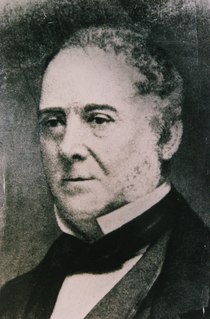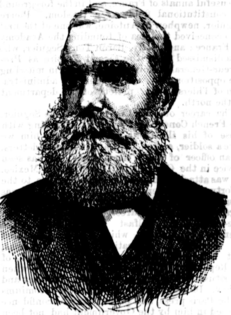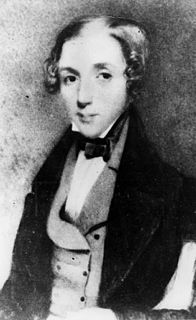Related Research Articles

Sir James Martin, QC was three times Premier of New South Wales, and Chief Justice of New South Wales from 1873 to 1886.
Clarence and Darling Downs was an electoral district of the Legislative Assembly in the Australian colony of New South Wales from 1856 to 1859. It included the Clarence Valley and the Darling Downs region. For the 1859 New South Wales colonial election The New South Wales part of the electorate was replaced by The Clarence while the Darling Downs was briefly a separate electorate prior to the separation of Queensland in December 1859.
New England and Macleay was an electoral district of the Legislative Assembly in the Australian state of New South Wales from 1856 to 1859, in the Northern Tablelands region of New England and part of the Mid North Coast region, including the area to the north of the Macleay River. but excluding the area south of the Macleay River which was included in the Counties of Gloucester and Macquarie. To the north was the electorate of Clarence and Darling Downs and to the west the electorate of Liverpool Plains and Gwydir. It elected two members, with voters casting two votes and the first two candidates being elected. It was partly replaced by New England.
Grafton was electoral district of the Legislative Assembly in the Australian state of New South Wales from 1880 to 1904 and was named after and included the town of Grafton.

Geoffrey Eagar was an accountant and colonial politician and civil servant in New South Wales, Australia.
John Fletcher Hargrave was an Australian politician and judge.
Robert Palmer Abbott was a politician and solicitor in colonial New South Wales, a member of both the Legislative Assembly and Legislative Council.
Clark Irving was an Australian merchant pastoralist and politician. He was a member of the New South Wales Legislative Assembly from 1856 until 1864.
The third Cowper ministry was the seventh ministry of the Colony of New South Wales, and third occasion of being led by Charles Cowper.
Clarence, an electoral district of the Legislative Assembly in the Australian state of New South Wales, has had two incarnations, the first from 1859 to 1920, the second from 1927 to the present.

Robert Owen was a politician, solicitor and judge in colonial New South Wales; a member of the New South Wales Legislative Assembly, and later, the New South Wales Legislative Council.
James Watson was an Australian politician, Colonial Treasurer of New South Wales 1878 to 1883.
James Alexander Hogue was an Australian journalist and politician.

Richard Stevenson was an English-born Australian politician.
Frederick Augustus Cooper was an Australian politician who was a Member of both the New South Wales Legislative Assembly, and the Queensland Legislative Assembly.

Border of Queensland and New South Wales
The 1858 New South Wales colonial election was to return 54 members of Legislative Assembly composed of 34 electoral districts with 18 returning 1 member, 13 returning 2 members, two returning 3 members and one returning 4 members, all with a first past the post system. In multi-member districts, because each voter could cast more than one vote, it is not possible to total the votes to show the number of voters and voter turnout in these districts is estimated. 17 members from 14 districts were returned unopposed. The electoral districts and boundaries were established under the Electoral Act 1851 (NSW) for the former Legislative Council.
A by-election was held for the New South Wales Legislative Assembly electorate of Upper Hunter on 3 July 1868 due to the resignation of sitting member James White, who left the colony to travel to England, Europe and the United States.
A by-election was held for the New South Wales Legislative Assembly electorate of East Maitland on 11 August 1863 because John Darvall had been appointed Attorney General in the third Cowper ministry. Such ministerial by-elections were usually uncontested however on this occasion the appointment of Darvall was controversial, not only was he a conservative appointed to the liberal ministry, but because John Hargrave, who had been Attorney General since March 1860, accepted the lesser role of Solicitor General to allow Darvall to be appointed.
A by-election was held for the New South Wales Legislative Assembly electorate of Namoi on 31 July 1890 because of the death of Tom Dangar.
References
- ↑ "Legislative Assembly: Mr Clark Irving". The Empire . 25 June 1863. p. 3. Retrieved 8 October 2019– via Trove.
"Legislative Assembly: Representation of The Clarence". The Sydney Morning Herald . 27 June 1863. p. 4. Retrieved 8 October 2019– via Trove. - ↑ Daley, Louise T. "Irving, Clark (1808–1865)". Australian Dictionary of Biography . Melbourne University Press. ISSN 1833-7538 . Retrieved 19 April 2019– via National Centre of Biography, Australian National University.
- ↑ "Writ of election: The Clarence". New South Wales Government Gazette (125). 1 July 1863. p. 1441. Retrieved 8 October 2019– via Trove.
- ↑ Green, Antony. "1863 The Clarence by-election". New South Wales Election Results 1856-2007. Parliament of New South Wales . Retrieved 8 October 2019.
- ↑ "Mr Clark Irving". Clarence and Richmond Examiner and New England Advertiser . 24 November 1863. p. 2. Retrieved 8 October 2019– via Trove.